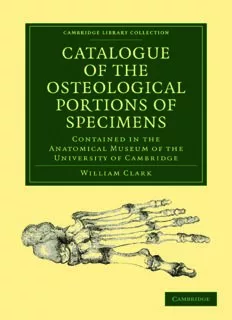
Catalogue of the Osteological Portions of Specimens Contained in the Anatomical Museum of the University of Cambridge PDF
Preview Catalogue of the Osteological Portions of Specimens Contained in the Anatomical Museum of the University of Cambridge
CAMBRIDGE LIBRARY COLLECTION Books of enduring scholarly value Darwin Two hundred years after his birth and 150 years after the publication of ‘On the Origin of Species’, Charles Darwin and his theories are still the focus of worldwide attention. This series offers not only works by Darwin, but also the writings of his mentors in Cambridge and elsewhere, and a survey of the impassioned scientific, philosophical and theological debates sparked by his ‘dangerous idea’. Catalogue of the Osteological Portions of Specimens Contained in the Anatomical Museum of the University of Cambridge William Clark was Professor of Anatomy at Cambridge for nearly 50 years, collecting many specimens of bones for use in the study of comparative anatomy, physiology and osteology. These formed a principal part of the collection that eventually became the university’s Museum of Zoology. He wished to support students of natural sciences in acquiring knowledge from direct observation of well arranged and accurately identified specimens. The 1289 items, catalogued in 1862, include 128 from humans of varying races and dates. These include masks of the faces of Isaac Newton, William Pitt and Benjamin Franklin. This focus reflects, in part, the nineteenth-century fascination with phrenology. A regular participant in the influential Cambridge Philosophical Society, in May 1860 William Clark made there what Darwin perceived to be a “savage onslaught” on his recently published Origin of Species. This book reveals Clark’s very different approach to studying the tree of life. Cambridge University Press has long been a pioneer in the reissuing of out-of- print titles from its own backlist, producing digital reprints of books that are still sought after by scholars and students but could not be reprinted economically using traditional technology. The Cambridge Library Collection extends this activity to a wider range of books which are still of importance to researchers and professionals, either for the source material they contain, or as landmarks in the history of their academic discipline. Drawing from the world-renowned collections in the Cambridge University Library, and guided by the advice of experts in each subject area, Cambridge University Press is using state-of-the-art scanning machines in its own Printing House to capture the content of each book selected for inclusion. The files are processed to give a consistently clear, crisp image, and the books finished to the high quality standard for which the Press is recognised around the world. The latest print-on-demand technology ensures that the books will remain available indefinitely, and that orders for single or multiple copies can quickly be supplied. The Cambridge Library Collection will bring back to life books of enduring scholarly value across a wide range of disciplines in the humanities and social sciences and in science and technology. Catalogue of the Osteological Portions of Specimens Contained in the Anatomical Museum of the University of Cambridge William Clark CAMBRIDGE UNIVERSITY PRESS Cambridge New York Melbourne Madrid Cape Town Singapore São Paolo Delhi Published in the United States of America by Cambridge University Press, New York www.cambridge.org Information on this title: www.cambridge.org/9781108004671 © in this compilation Cambridge University Press 2009 This edition first published This digitally printed version 2009 ISBN 978-1-108-00467-1 This book reproduces the text of the original edition. The content and language reflect the beliefs, practices and terminology of their time, and have not been updated. CATALOGUE OP THE ANATOMICAL MUSEUM, CAMBRIDGE. PRINTED BY 0. J. CLAY, M.A. AT THE UNIVERSITY PRESS. H0ttfJ0tt: RIVINGTONS, 32, PATERNOSTER-ROW, AND 3, WATERLOO PLACE. Camimtrge: DEIOHTON, BELL, & co. CATALOGUE OF THB OSTEOLOGICAL PORTION OF SPECIMENS CONTAINED IN Anatomical OP THE UNIVERSITY OF CAMBRIDGE. for t\)t £>gnWc$$ of tijt CAMBRIDGE: AT THE UNIVERSITY PBESS. 1862. PKEFACE. THIS Catalogue records the Osteological Specimens in the possession of the University. I have also included in it some Birds and Mammals stuffed, and some Fishes and Reptiles in spirit, because I think that it may frequently be advantageous to students, for whom this collection is chiefly designed, to have an opportunity of comparing the external characters of any groups in which they may be interested with the osteo- logical. This is a plan which has been followed with success in several Continental Museums, especially in that of the University of Pavia. As the value of such a collection as this depends in a great measure on the accuracy with which the specimens are named, I have never appended a specific name without due authority for it, and have preferred, in doubtful cases, to append the generic name alone. Whenever I found a diffi- culty in determining a specimen from descriptions, I took it to the British Museum, for comparison with a series of great extent and of different ages. I take this opportunity of thanking Professor Owen and Mr Gerrard for their great kindness in devoting many hours of their valuable time to the identification of the specimens shown to them.
Description: